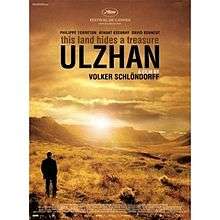Ulzhan
| Ulzhan | |
|---|---|
 | |
| Directed by | Volker Schlöndorff |
| Produced by |
Regis Ghezelbash Sergey Azimov |
| Written by |
Jean-Claude Carrière Volker Schlöndorff |
| Starring |
Philippe Torreton Ayanat Ksenbai David Bennent |
| Music by |
Bruno Coulais Kuat Shildebayev Ruben Haroutunian |
| Cinematography | Tom Fährmann |
| Edited by | Peter R. Adam |
| Distributed by | Rezo Films |
Release dates | December 13, 2007 |
Running time | 105 |
| Country |
France Germany Kazakhstan |
| Language | French |
Ulzhan is a 2007 international co-production directed by Volker Schlöndorff, starring Philippe Torreton, Ayanat Ksenbai (formerly credited as Ayana Yesmagambetova[1]) and David Bennent.
Plot
The Frenchman Charles travels in Kazakhstan and when his car stops working, he is determined to continue his journey by walking until he can get a horse. The young local French teacher Ulzhan decides to accompany and support him. She learns that Charles is heading for the mountain Khan Tengri. Along the way they are joined by New Age shaman Shakuni. They all approach the storied mountain which Shakuni considers holy. Whether they will find there a hidden treasure or salvation is left to the viewer's speculation.
Reception
In Germany "Ulzhan" received "predominantly positive press reviews".[2] Lidia Louk (The Epoch Times) wroth "Ulzhan" was besides a human drama also a satire about a society which had to accomplish a swift change from communism to "turbo-capitalism".[3] Hans-Bernhard Moeller (associate professor of Germanic Studies at the University of Texas at Austin[4]) and George Lellis (professor of communication at Coker College[5]) honoured "Ulzhan" by publishing an in-depth review of 3582 words titled "Ulzhan: Schlöndorff’s Globalized Eastern Western".[6] Their essay attests Volker Schlöndorff to have made "abstract issues" seizable "through transposing the conventions of the Western into the frontier between Europe and Asia –physically, intellectually, and spiritually". They also certified "Ulzhan" a "special complexity" achieved by "its refusal to let its themes be reduced to a simple bipolar opposition". Variety's very different review just compared "Ulzhan" with another film and came finally to a mathematical result which stated that 1 reel of The Treasure of the Sierra Madre delivered more clashes and oral exposition than the 10 reels of "Ulzhan". [7] ABC's Julie Rigg compared "Ulzhan" instead with Paris, Texas and found it "haunting" but at the same time "mysterious and beautiful". [8]
References
- ↑ "Kazakh actress Ayanat Ksenbai (a.k.a. Ayana Yesmagambetova), who was in Volker Schlöndorff's Ulzhan (2007) and in the Kazakh epic Nomad (2005).". Retrieved 2009-03-10.
- ↑ Moeller, Ellis, Hans-Bernhard, George. "Following its world premiere at the May 2007 Cannes Film Festival, Ulzhan was released in Germany on December 13, to predominantly positive press reviews.". www.offscreen.com. Austin. Retrieved 2008-05-12.
- ↑ Louk, Lidia. "Apart from being a sweetly emotional and melancholic drama, the film also provides satire on modern Kazakhstan, where communism has been swiftly turned into turbo-capitalism.". The Epoch Times. New York. Retrieved 2007-10-07.
- ↑ "Hans-Bernhard Moeller, Professor Emeritus — Ph.D., German, University of Southern California, Los Angeles". Retrieved 2012-03-10.
- ↑ "George P. Lellis, Ph.D.". Retrieved 2012-10-03.
- ↑ "Ulzhan: Schlöndorff's Globalized Eastern Western". Retrieved 2008-05-12.
- ↑ Elley, Derek. "there's more drama, character conflict and human commentary in one reel of "The Treasure of the Sierra Madre" than all 10 of "Ulzhan."". Variety. Cannes. Retrieved 2007-05-22.
- ↑ "Ulzhan, a mysterious and beautiful film... It's a haunting film, a kind of Paris, Texas on the Steppes". Retrieved 2009-02-20.